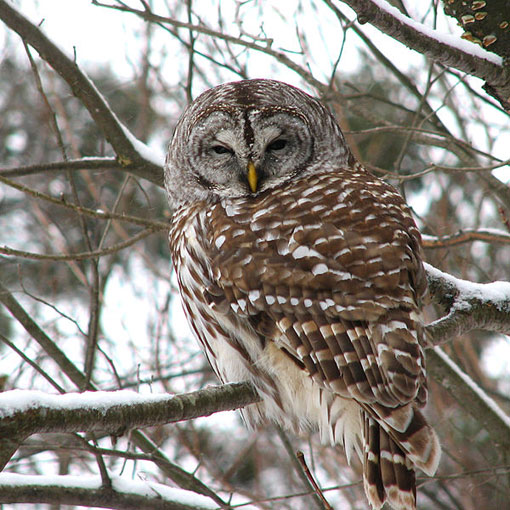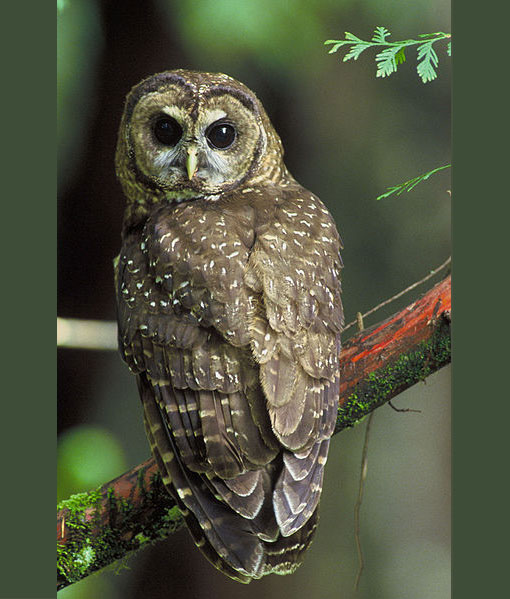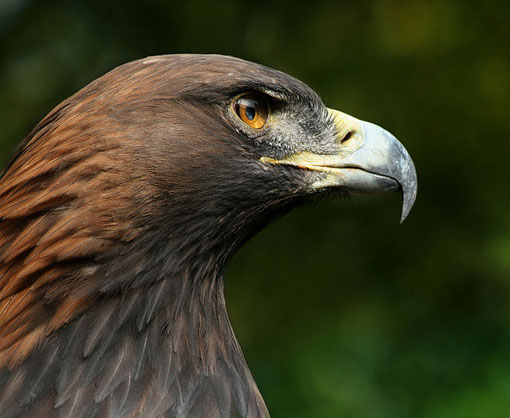You are hereBlogs / WcP.Watchful.Eye's blog / "Deforest to prevent wildfire", "kill barred owl to save another species"...sounds like whalers blaming whales, not overfishing
"Deforest to prevent wildfire", "kill barred owl to save another species"...sounds like whalers blaming whales, not overfishing


Nature has nature’s law. We humans are just part of Nature. Forests, rather than dead land without trees, supply priceless necessities (shelter, food, oxygen, balanced weather, etc...) for humans... A good example - life in all forms is easily sustained in forests. Wildfires, if not caused by human error, are Nature’s call, and trees will come out the following spring. Sensitive birds (remember they have wings) know full well to fly away from harmful situations, particularly at the onset of smoke when the fire starts... yet unfortunately they can hardly survive without the environment for them to survive – forests... and sadly their speed is no faster than a hunter’s bullet. When mankind appreciates and takes care of Nature, Nature takes care of mankind. Philosophy and science are mostly stemmed from observing nature, and discovering nature’s laws, which make us wiser. As Einstein once said, “look into nature, and you will understand everything better”.

(quote)
The barred owl (Strix varia) may be as much of a threat to spotted owls as the cutting of old growth forest. The U.S. Fish and Wildlife Service recently proposed hunting down the barred owl bullies, but conservationists cry fowl, er, foul and worry the barred owls may be scapegoats. Barred owls started encroaching on spotted owls territory in the 1950's as human activities created habitat corridors leading from their eastern homeland. “Larger, more aggressive and more adaptable than the northern spotted owl, barred owls are known to displace spotted owls, disrupt their nesting and compete with them for food,” according to a U.S. Fish and Wildlife Service (USFWS) fact sheet. "Researchers have also observed instances of barred owls interbreeding with or killing spotted owls." The USFWS proposes killing or removing 257 to 8,960 barred owls at up to 11 experimental sites, according to their environmental impact statement.
"allowing logging to reduce the risk of catastrophic wildfire"
A plan announced Tuesday would designate habitat considered critical for the bird’s survival, while allowing logging to reduce the risk of catastrophic wildfire and to create jobs. Habitat loss and competition from barred owls are the biggest threats to the spotted owl.
So in response to your article "Barred owls to die to help save cousins" (Feb. 29), I would like to suggest that "make love, not war" would appear to be an alternative to the killing of the barred owls. There are pheromones available to help the owls get together.
A local group, We Are One, had delivered the owl to a veterinarian at Washington State University's Veterinary Teaching Hospital in Pullman, where he was declared to be a hybrid between a northern spotted owl and a barred owl and given the name Orville. The headline in the newspaper, "Orville the owl is doing OK, vet says" is why I happened to pick up the newspaper. There was also a charming photograph of Orville.
So in response to your article "Barred owls to die to help save cousins" (Feb. 29), I would like to suggest that "make love, not war" would appear to be an alternative to the killing of the barred owls. There are pheromones available to help the owls get together.
The Barred Owl (Strix varia) is a large typical owl native to North America. It goes by many other names, including Eight Hooter, Rain Owl, Wood Owl, and Striped Owl, but is probably best known as the Hoot Owl based on its call. The adult is 40–63 cm (16–25 in) long with a 96–125 cm (38–49 in) wingspan. Weight in this species is 500 to 1050 grams (1.1-2.3 lbs). It has a pale face with dark rings around the eyes, a yellow beak and brown eyes. It is the only typical owl of the eastern United States which has brown eyes; all others have yellow eyes. The head is round and lacks ear tufts, a distinction from the Short-eared Owl. The upper parts are mottled gray-brown. The underparts are light with markings; the chest is barred horizontally while the belly is streaked vertically. The legs and feet are covered in feathers up to the talons.
As top predators, golden eagles are essential for ecosystem health, because they keep prey species in check. “I say ‘cautious optimism’ because we fear that the agency is going to go forward and start issuing these permits… for a multitude of golden eagles every year, and that would be a bad use of the policy,” Nysson said. The golden eagle is not an endangered species, or even threatened, but it is protected under the the Bald and Golden Eagle Protection Act of 1940. A provision put in place in 2009 allows take permits to be issued.
(unquote)
Photos courtesy John McDonnell / TWP / TWP, D. Gordon E. Robertson, John and Karen Hollingsworth, and Richard Bartz / Wikimedia Commons



















So after reading this article and the argument for why we shouldn't log this land and use it for development I have to say I just don't get it. I know I'm just a lowly programmer and maybe I don't understand all of this stuff fully but won't the birds habitat be destroyed anyhow with the next big fire that blows through?
Nature has nature’s law. We humans are just part of Nature. Forests, rather than dead land without trees, supply priceless necessities (shelter, food, oxygen, balanced weather, etc...) for humans... A good example - life in all forms is easily sustained in forests. Wildfires, if not caused by human error, are Nature’s call, and trees will come out the following spring. Sensitive birds (remember they have wings) know full well to fly away from harmful situations, particularly at the onset of smoke when the fire starts... yet unfortunately they can hardly survive without the environment for them to survive – forests... and sadly their speed is no faster than a hunter’s bullet. When mankind appreciates and takes care of Nature, Nature takes care of mankind. Philosophy and science are mostly stemmed from observing nature, and discovering nature’s laws, which make us wiser. As Einstein once said, “look into nature, and you will understand everything better”.